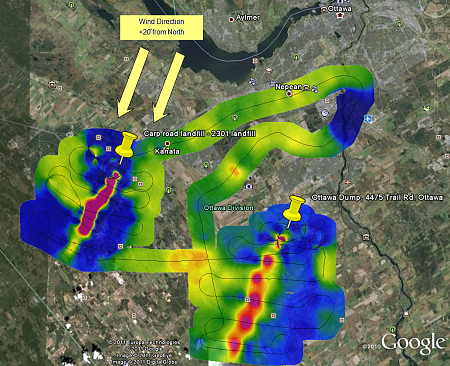
Airborne Methane Sensing
Sander Geophysics Limited (SGL) offers direct detection
of hydrocarbon gases that naturally seep into the air.
These gases can be related to active hydrocarbon systems,
industrial activity, biogenic processes and landfills.
Methane surveys conducted by SGL have shown that methane
concentrations related to hydrocarbon systems are well
above background levels, even in jungle environments. SGL
uses ultra sensitive high resolution sensors mounted in a
survey aircraft to record methane gas concentrations in
the air. These airborne data can then be used to map
ground level gas flux rates, matching measured data to
known methane sources and potential hydrocarbon seeps.
Airborne Methane Sensing Surveys at SGL
SGL conducts methane surveys for petroleum exploration
and environmental mapping. Intake air is collected by an
inlet port mounted externally on the survey aircraft and
is pumped through a particle separator filter to an
off-axis integrated cavity output spectroscopy (OA-ICOS)
analyzer recording at up to 20 Hz. Other geophysical
information, such as gravity or magnetic data, can be
collected simultaneously using SGL´s fixed-wing and
helicopter platforms, thereby increasing the survey
benefits.
The position recovery uses NovAtel multi-frequency GNS
(GPS) receivers in the aircraft and on the ground,
processed using SGL´s proprietary GPSoft navigation
processing system, resulting in a horizontal position
accuracy of better than 0.2 m and a vertical position
accuracy of better than 0.3 m.
Proprietary processing is used to calculate the
equivalent ground flux rate from the measured airborne
data. Working with Shell Global Solution B.V., SGL has
successfully measured methane gas flux over varied terrain
including arid regions and jungle.

Measured hydrocarbon
concentration above known methane sources
Methane Sensing Survey System
| Airborne Instruments |
| SGMethane Detection
System |
Resolution
(ppb) |
Calibrated
to |
Range |
| 1 |
<0.03% of
concentration |
10 ppb
to 25 ppm |
| Data Acquisition System |
Sander Geophysics — SGDAS
airborne computer
Capable of recording unlimited number of channels at
variable intervals, and digital scrolling chart
display of the data. Data are recorded on a
vibration tolerant removable drive. The system
clock is a quartz time standard automatically
synchronized to UTC by the GPS signal to an accuracy
of 1 millisecond. |
| Video Imaging System |
Sander Geophysics — SGDIS
digital video |
| |
|
Resolution (m) |
Calibrated to |
Range
(m) |
| Laser Altimeter |
Riegl LD90-31K-HiP |
0.05 |
<1% |
0 to 1,000
(3,300 ft) |
| Radar Altimeter |
King KRA-10 |
0.05 |
5% |
0 to 760
(2,500 ft) |
| Barometric Altimeter |
Honeywell TJE |
2.0 |
±4 m |
0 to 10,000
(30,000 ft) |
Instruments for Simultaneous Multidisciplinary Surveys
| MAGNETICS |
| Sensor |
Geometrics
Strap-down, optically pumped, cesium split beam
Sensitivity: 0.005 nT
Sensor noise level: <0.02 nT
Sampling rate: 10 Hz |
| Compensator |
Sander Geophysics — AIRComp
real-time digital compensation
Range: 20,000 to 200,000 nT
Resolution: 0.001 nT
Sampling rate: 160 Hz |
| RADIOMETRICS |
| Spectrometer |
SGSpec or Radiation Solutions
RS-500 |
| Detector Volume |
16.8 to 50.4 litres of
downward-looking crystals
4.2 to 12.6 litres of upward-looking crystals |
| GRAVITY |
| Gravimeter |
Sander Geophysics — AIRGrav,
Airborne Inertially Referenced Gravimeter |
|